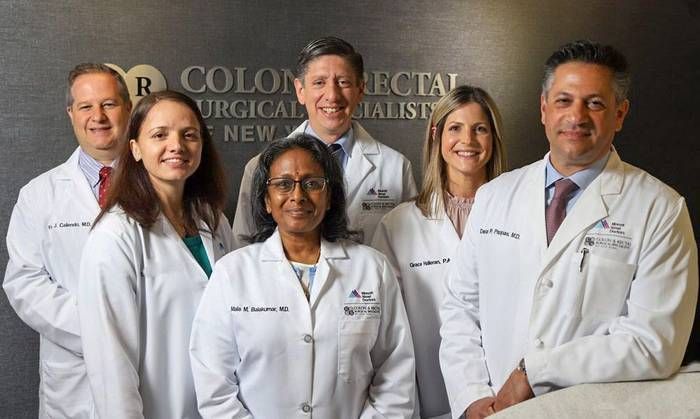
BY DEAN PAPPAS M.D.
People on Long Island know that they can count on our team of doctors for expert insight and advice about colorectal health. We at Colon & Rectal Surgical Specialists of New York pride ourselves on our ability to help patients achieve wellness through proper diagnosis and advanced treatment.
Colon polyps could be a warning sign of cancer, which is why we always inform patients of the potential warning signs. We’d like to take a moment to go over the symptoms and risk factors of colon polyps so you know what to look for and when to seek medical attention.
About Colon Polyps
A colon polyp refers to a small clump of cells that forms along the lining of a person’s colon. In many cases, a colon polyp is harmless. It is possible for some colon polyps to develop into colon cancer. This is why it’s important to monitor the growth and development of any polyps.
Common Symptoms of Colon Polyps
The most common signs and symptoms of colon polyps include the following:
- Bleeding from the Rectum – A number of conditions that affect the colon and the rectum tend to result in rectal bleeding.
- Changes in Bowel Movements – Sometimes colon polyps can lead to constipation or diarrhea that persists for longer than a week, as well as general changes in bowel habits.
- Changes in Stool Color – Blood can wind up in your stool, often causing your stool to appear black or much darker in color.
- Anemia and Iron Deficiency – Colon polyps that bleed can lead to iron deficiency, resulting in fatigue and shortness of breath.
- Cramping, Nausea, and Vomiting – Large polyps in the colon can lead to bowel obstructions, causing cramps, pain, nausea, and vomiting.
Be sure to see a doctor if you notice blood in your stool, abdominal pain, or changes in your bowel habits that last longer than one week.
Risk Factors for Colon Polyps
The following are considered risk factors for developing colon polyps:
- Advanced Age – The risk of developing colon polyps increases after the age of 50.
- Inflammatory Bowel Disease – People with Crohn’s disease or ulcerative colitis are more likely to suffer from colon polyps later in life.
- Family History – Your risk of colon polyps goes up if you have family members who have also developed them.
- Race/Ethnicity – People of African-American descent have shown a great risk of developing colon polyps.
- Use of Tobacco Products and Alcohol – Use of tobacco products and alcohol contributes to a number of health conditions.
- Obesity – Obesity and sedentary lifestyles can make colon polyps far more likely.
If any of the above risk factors are present, be sure to discuss regular colon or rectal exams with your general practitioner. Early detection and diagnosis can make a major difference in your general wellness moving forward.
Treating Colon Polyps
Treating colon polyps can be a simple process. In many cases, the polyps can be removed through a biopsy that uses forceps as part of a bowel examination. Larger polyps that cannot be removed during a regular screening will require minimally invasive surgery. More advanced surgeries may be required for certain situations.
Since polyps may be linked to an increased risk of colon cancer, it’s important for regular exams and screenings to occur as part of your follow-up care after polyp removal.
Contact Colon & Rectal Surgical Specialists of New York
If you would like to know more about colon polyps and how our team can help diagnose and treat them, be sure to contact our team of colon and rectal surgery specialists today. The experts at Colon & Rectal Surgical Specialists of New York will provide honest insight into medical conditions and treatment options.


